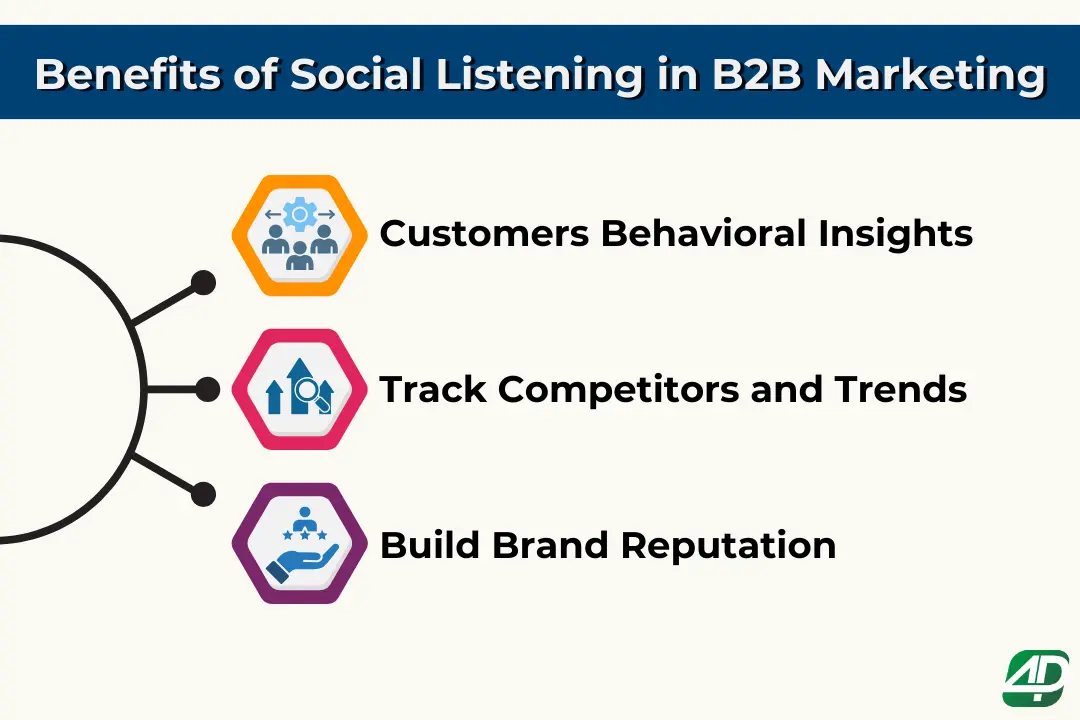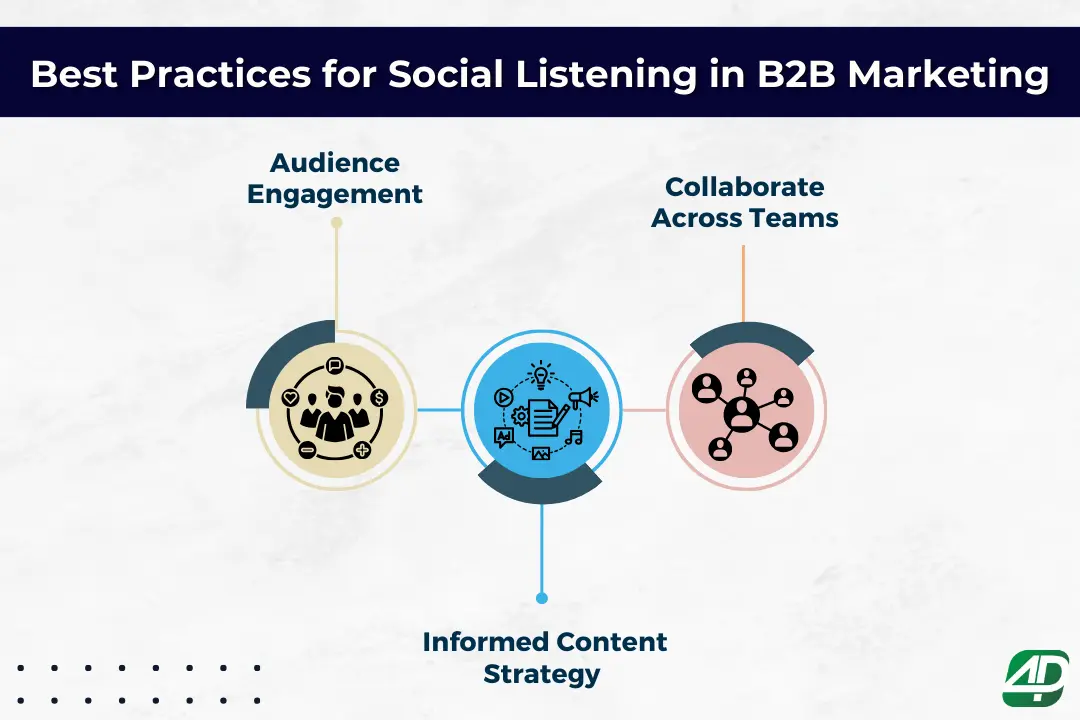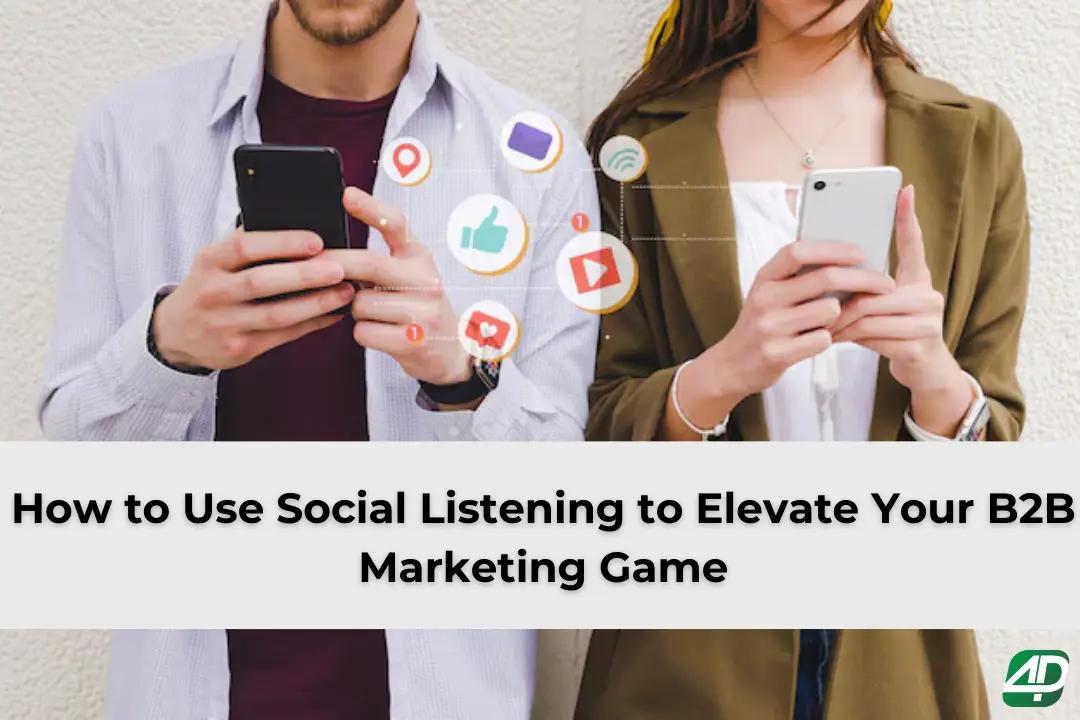Introduction
Social listening is more than just keeping an ear out for mentions of your brand online. It’s the strategic process of monitoring conversations across social media and digital platforms to understand what’s being said about your company, industry, and competitors. It goes beyond simply “listening” to actively analyzing the data and turning it into actionable insights.
Highlights:
This insight could redefine your strategy: A staggering 90% of B2B purchasers place their trust in the recommendations of their peers, while 85% place unwavering confidence in user reviews authored by fellow professionals within their industry.
Importance of Social Listening in B2B Marketing
Social listening helps you understand those peer conversations, identify what influences buying decisions, and position your brand accordingly. In the complex, long sales cycles of B2B, where multiple stakeholders are involved, it can provide a clear edge by revealing customer intent and B2B industry trends.
In this blog, we'll take a closer look at social listening and how it's used in B2B marketing.
Benefits of Social Listening in B2B Marketing

To begin, let’s uncover how social listening transforms B2B marketing.
1. Customers Behavioral Insights :
Social listening helps you tap into your audience’s unfiltered thoughts. What challenges are they discussing? Which solutions are they praising? By analyzing these conversations, you can better tailor your messaging, products, and services to align with their needs. This approach fosters data-driven B2B marketing that hits the mark.
2. Track Competitors and Trends :
Want to know what’s happening in your industry without attending every trade show or conference? Social listening offers real-time insights into tracking industry trends in B2B and what your competitors are doing. Spot opportunities to fill gaps they’re leaving or differentiate yourself with a unique perspective.
3. Build Brand Reputation :
Improving brand reputation with social listening is all about being proactive. Addressing negative feedback or questions promptly can turn potential crises into trust-building moments. Acknowledging and acting on customer concerns shows you’re not just hearing but truly listening.
How to Implement Social Listening in B2B Marketing
Here is step-by-step guidance on implementing social listening strategies.
1. Select Listening Tools :
Start by selecting tools tailored to your needs. Popular social listening tools for businesses like Hootsuite, Sprout Social, and Brandwatch offer features to track mentions, monitor keywords, and analyze sentiment. Pick one that integrates well with your existing workflows.
2. Choose Relevant Keywords :
The magic lies in choosing the right keywords. Beyond just your brand name, include industry terms, competitor names, and pain points common to your audience. For instance, if you’re in SaaS, track terms like “cloud solutions challenges” or “best SaaS tools.”
3. Analyze and Act :
Data without action is meaningless. Look for patterns in customer feedback, competitor mentions, and industry discussions. Then, create a plan to address gaps, improve services, or craft campaigns that resonate with your audience’s needs.
Best Practices for Social Listening in B2B Marketing

With these best practices for engaging your audience and using insights effectively, you’ll know how to use social listening to reshape your B2B social media strategy and stay ahead in your industry.
1. Audience Engagement :
When you see a mention or question about your brand, respond promptly and authentically. Engagement fosters trust and positions your company as approachable and attentive. This is a crucial aspect of B2B audience engagement tips that many overlook.
2. Informed Content Strategy :
Turn the insights you gather into content that speaks directly to your audience. If your audience frequently discusses challenges with supply chain management, for instance, create blog posts or webinars that address these issues head-on.
3. Collaborate Across Teams :
Social listening isn’t just a marketing tool. Share insights with sales to refine their pitches or with customer service to address common pain points. Collaboration ensures your organization operates as a unified team.
How The 4P Solutions Can Transform Your B2B Marketing with Social Listening?
At The 4P Solutions, we are a leading social media marketing agency in Mumbai, helping businesses elevate their digital marketing game. We specialize in using social listening and data-driven insights to craft customized strategies that drive success.
Here’s how our B2B digital marketing agency can help you:
-
B2B Content Marketing Expertise:
- We craft engaging, valuable content tailored to your B2B audience’s needs, improving brand visibility and trust. LinkedIn B2B Marketing:
- As a LinkedIn marketing agency, we leverage the platform’s power to target decision-makers and build meaningful connections within your industry. Social Listening Integration:
- We integrate social listening tools into your B2B digital marketing strategy to capture real-time insights, allowing you to stay ahead of trends and competitor actions. Data-Driven Strategies:
- Our approach combines data-driven B2B marketing with social listening, helping you track customer behavior and refine your campaigns for better results. Comprehensive Campaign Management:
- From strategy to execution, we manage every aspect of your B2B social listening, ensuring your brand message resonates with the right audience.
For more information regarding our B2B digital marketing services, reach out to us at at mktg@the4psolutions.com or give us a call at +91 89286 09451
Conclusion
Social listening is a game-changer for data-driven B2B marketing. It lets you understand your customers, monitor your competition, and improve your reputation. It’s not just about gathering data but turning it into a strategic advantage.
FAQs
Social monitoring focuses on tracking brand mentions, while social listening goes further by analyzing conversations to extract insights and trends, helping you make informed business decisions.
You should analyze data regularly, ideally on a weekly or monthly basis, depending on the volume of conversations related to your brand and industry.
Sentiment analysis helps you gauge whether the conversations about your brand are positive, neutral, or negative. This can be useful for adjusting marketing strategies or addressing concerns.
Success can be measured by tracking improvements in customer satisfaction, increased engagement, more targeted content, or better competitive position

